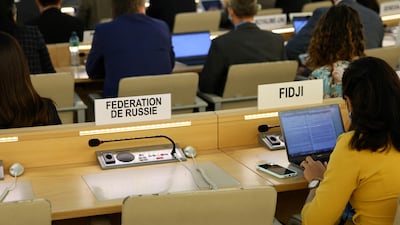Russia is formally seeking to rejoin the UN Human Rights Council for a three-year term, nearly 18 months after it was expelled from the body over its invasion of Ukraine.
The Russian position paper, seen by The National, says that if Moscow is elected in the October 10 vote, it would use its membership “to prevent the increasing trend of turning the HRC into an instrument which serves the political will of one group of countries punishing non-loyal governments for their independent and external policy”.
During a speech in New York to mark his country's candidacy on Thursday, Vasily Nebenzya, Russia's top envoy at the UN, called for equal treatment of all countries by the council.
He stressed the need to protect the UN Human Rights body from "double standards", asserting that there are no 'beacons of democracy' or 'rogue states,' and no member state can be considered immune from human rights violations.
Mr Nebenzya's speech came after Russia was accused of carrying out one of its worst strikes on Ukraine since the war began in February 2022. At least 52 people were killed in a missile strike on a rural village in the Kharkiv region.
“When Russia announced their candidacy, I just had to wonder … can they actually be serious?” Rachel Denber, Human Rights Watch's deputy director for Europe, told reporters on Thursday.
“Well they are dead serious about it. There are some states that are beyond the pale and Russia is one of them when it comes to standards that the UN Human Rights Council is supposed to uphold.”
Russia was suspended from the HRC in April 2022 nearly halfway through its three-year term with 93 members of the UN General Assembly voting in favour, 24 against and 58 abstaining.
The Kremlin blamed its suspension on the “initiative of the United States and its allies”.
In a report presented to the HRC last month, the UN’s independent commission of inquiry on Ukraine documented a growing body of evidence of war crimes and possible crimes against humanity committed by Russia.
Torture was used “during interrogation sessions, mainly aimed at extracting information from the victims”, said Norwegian judge Erik Mose, the chairman of the three-member commission.
Russia's President Vladimir Putin is also wanted by the International Criminal Court on accusations of war crimes in Ukraine.
Established in 2006, the UN’s top human rights body is composed of 47-members who are elected by the majority of members of the UN General Assembly through direct and secret ballot.
The UN organised its member states into five geopolitical regional blocs to ensure a fair geographical distribution.
Russia is competing with Bulgaria and Albania for two Eastern European seats, with each candidate requiring a majority of at least 97 votes to secure a three-year term.
Richard Gowan, who oversees Crisis Group's advocacy work at the UN, told The National that western diplomats seem quite worried that Russia will succeed, “although there is a sense that Albania is picking up support in the final days of the campaign”.
“The Russians will hope that their quiet friends will support them in a secret ballot,” he remarked, emphasising that the extent of this support will signal a diminishing sense of isolation for Moscow within the UN.
The HRC calls for states voting for members to “take into account the contribution of candidates to the promotion and protection of human rights.”
The only country to have its membership rights stripped was Libya in 2011, when Muammar Qaddafi, its leader at the time, brutally suppressed political demonstrators.


